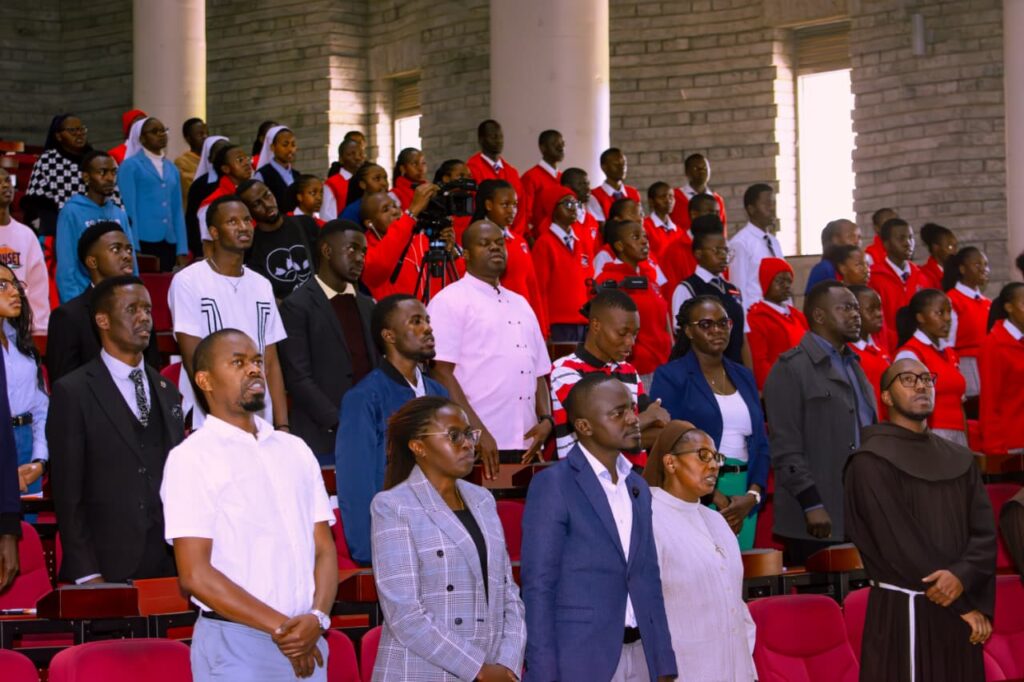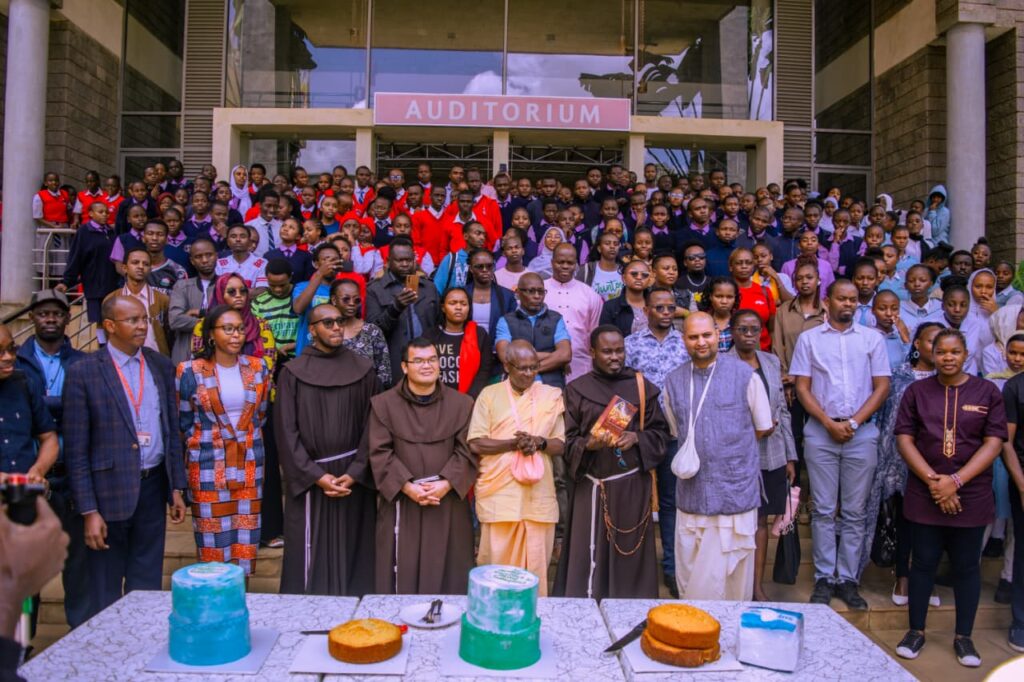On 19th September 2025, the Catholic University of Eastern Africa (CUEA) came alive with prayers, music, youthful energy, and powerful conversations as students, faith leaders, environmental experts, and community representatives gathered for the Interfaith Youth Forum on Peace with Creation.
The forum, co-organized by the Franciscan family and partners including Harmony Institute, carried the theme “Peace with Creation.” It became a meeting point where spirituality, science, and youth leadership intersected to call for a future free from fossil fuels and grounded in renewable energy.
The day began with interfaith prayers led by Fr. Peter Mbaru (CUEA Chaplain) and Saida Omar (Harmony Institute). The Kenya and East African anthems set a unifying rhythm, followed by warm remarks from Dr. Wilkister Shanyisa, Head of Department at CSJE-CUEA, and reflections from Sr. Mary Wangare Sebastian (JPIC Franciscans Africa) on the interfaith journey.

In his keynote, Very Rev. Prof. Stephen Mbugua Ngari, Vice Chancellor of CUEA, underlined that peace with creation is not an abstract idea but a moral duty. Sheikh Abu Hamza and Br. Eric Mutabazi (JPIC OFM International Committee) emphasized that faith traditions already carry the mandate to protect creation.
Adding a policy perspective, Peter Maneno (Assistant Director of Climate Change, GHGI) unpacked key outcomes of the Africa Climate Summit, particularly on energy transitions. A celebratory moment followed as participants marked 800 years of Franciscan heritage and 10 years of Laudato Si’ with a symbolic cake-cutting.
One of the day’s highlights was a Faith Leaders’ Panel on “Raising Faith Voices in Support of a Just Transition to Renewable Energy.” Moderated by Ashley Kitisya (Laudato Si’ Movement), the panel featured diverse voices, including Harmony Institute’s Harun Thuku (representing Dr. Erkan), Holiance Odhiambo (Bahá’í Faith), Rukiya Khamis (350 Africa – Repower Africa), and Sr. Faith Kamau (Solar in Faith Communities), among others.
The discussion asked bold questions:
-
What is the real cost of fossil fuels in Africa?
-
Can renewable energy spark Africa’s future?
-
What role do faith communities play in the transition?
Panelists agreed that fossil fuels disproportionately harm vulnerable communities, while renewable energy offers Africa opportunities for sustainable growth, job creation, and justice. Faith communities, they stressed, have both the moral authority and grassroots networks to inspire this transformation.
Youth at the Center
Moderated by Hillary from Oxfam, the Interfaith Youth Dialogue gave the microphone to young people such as Lynn Modesta (Green Faith), students from St. Michael’s and St. Anne’s Secondary Schools, and Vallary Ochieng (OA Youth Org).
Their testimonies—ranging from the loss of livelihoods to climate-driven school challenges—were raw, powerful, and inspiring. They urged universities and schools to champion conservation as part of their identity and called on global leaders heading to COP30 to put just transition at the top of the agenda.
The afternoon brought creativity and commitment. Schools, NGOs, congregations, and individuals took part in a Commitment & Pledge Session led by Saida Omar, where participants placed their right hands on their chests and wrote down their renewable energy pledges. These will be consolidated into a joint statement to guide ongoing advocacy.
The Kenya Wildlife Service and Hare Krishna Temple shared their conservation contributions, reminding participants of the diverse efforts already underway.
To crown the day, a Green Talent Show—organized by YOUNIB TV—featured drama, music, poetry, and dance. Performances celebrated the beauty of creation while warning of the dangers of neglect. Awards recognized outstanding contributions, infusing the forum with joy and pride.
Why This Forum Matters
The Interfaith Youth Forum at CUEA was more than an event; it was a movement of hope and action. It showed that ecological justice is not only scientific or political but deeply spiritual. Faith leaders, educators, and youth together declared that Africa’s energy future must be renewable, inclusive, and just.
As Harmony Institute continues to walk with partners on this journey, the message is clear: “Peace with Creation” is both a calling and a collective mission. The pledges made will guide advocacy beyond Nairobi, echoing into COP30 and the global stage.

✨ Harmony Institute celebrates being part of this transformative gathering and reaffirms its commitment to interfaith dialogue, ecological justice, and empowering youth to lead the transition toward renewable energy.



